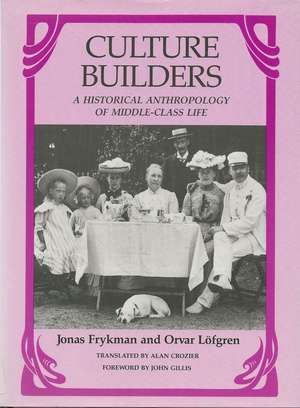Culture Builders: A Historical Anthropology of Middle Class Life
Autor Jonas Frykman, Orvar Lofgrenen Limba Engleză Paperback – apr 1987
The culture of the bourgeoisie gradually came to dominate European society during the nineteenth century. Jonas Frykman and Orvar Löfgren examine how this new style of life developed and how it spread. They focus on Swedish society from 1880 to 1910, conceptualizing events and behavior in a way that applies to western culture in general during that era, and illustrate their yhemeswith contemporary photographs. Through their interpretation, we are reminded that middle-class culture is only one alternative among many, and not always the best.
Culture Builders deals primarily with the ways in which ideas about the good and proper life are anchored in the trivialities and routines of everyday life: in the sharing of a meal, in holiday-making, and in the upbringing of children. The authors describe how the attitudes of the bourgeoisie toward. Time and time-keeping set them apart from the peasantry. Uses and perceptions of naturals increasingly divided the classes. For peasants, nature consisted of natural resources to be used. Fr the bourgeoisie, nature had only non-productive connotations. Another change was the growing importance of home over the community. Life became a romantic ideal, not an economic necessity. For the first time, parents became self-conscious about how to raise their children.
Frykman and Lögnen also show how the middle-class developed new perceptions of dirt, pollution, orderliness, health, sexuality, and bodily functions, and how they disdained the filth of peasant households. By stressing refinement, rationality, morality, and discipline, the middle classes were able to differentiate themselves not only from the peasants, but also from the degenerate aristocracy and the disordered and uncontolled emerging working class. The bourgeoisie viewed their own form of culture as the highest on the evolutionary ladder, and turned it into a national culture against which all other groups would be measured.
Culture Builders deals primarily with the ways in which ideas about the good and proper life are anchored in the trivialities and routines of everyday life: in the sharing of a meal, in holiday-making, and in the upbringing of children. The authors describe how the attitudes of the bourgeoisie toward. Time and time-keeping set them apart from the peasantry. Uses and perceptions of naturals increasingly divided the classes. For peasants, nature consisted of natural resources to be used. Fr the bourgeoisie, nature had only non-productive connotations. Another change was the growing importance of home over the community. Life became a romantic ideal, not an economic necessity. For the first time, parents became self-conscious about how to raise their children.
Frykman and Lögnen also show how the middle-class developed new perceptions of dirt, pollution, orderliness, health, sexuality, and bodily functions, and how they disdained the filth of peasant households. By stressing refinement, rationality, morality, and discipline, the middle classes were able to differentiate themselves not only from the peasants, but also from the degenerate aristocracy and the disordered and uncontolled emerging working class. The bourgeoisie viewed their own form of culture as the highest on the evolutionary ladder, and turned it into a national culture against which all other groups would be measured.
Preț: 340.54 lei
Nou
Puncte Express: 511
Preț estimativ în valută:
65.16€ • 69.68$ • 54.33£
65.16€ • 69.68$ • 54.33£
Carte tipărită la comandă
Livrare economică 18 aprilie-02 mai
Preluare comenzi: 021 569.72.76
Specificații
ISBN-13: 9780813512396
ISBN-10: 0813512395
Pagini: 334
Ilustrații: 1
Dimensiuni: 152 x 203 x 23 mm
Greutate: 0.48 kg
Ediția:None
Editura: Rutgers University Press
Colecția Rutgers University Press
ISBN-10: 0813512395
Pagini: 334
Ilustrații: 1
Dimensiuni: 152 x 203 x 23 mm
Greutate: 0.48 kg
Ediția:None
Editura: Rutgers University Press
Colecția Rutgers University Press
Notă biografică
Jonas Frykman were in the Department of European Ethnology at the University of Lund, Seden.
Orvar Löfgren were in the Department of European Ethnology at the University of Lund, Seden.
John Gillis was a Professor of History at Rutgers University.
Alan Crozier translated this book from the original Swedish edition.
Orvar Löfgren were in the Department of European Ethnology at the University of Lund, Seden.
John Gillis was a Professor of History at Rutgers University.
Alan Crozier translated this book from the original Swedish edition.
Cuprins
Foreword by John Gillis
Introduction
Rational and Sensitive: Changing Attitudes to Time, Nature, and the Home
1. The Time Keepers
2. The Nature Lovers
3. The Home Builders
Clean and Proper: Body and Soul Through Peasant and Bourgeois Eyes
4. The Cultural Basis of Physical Aversion
5. Peasant Views of Purity and Dirt
6. Bourgeois Discipline
Conclusion: A Culture On the Move
Notes
Bibliography
Index
Introduction
Rational and Sensitive: Changing Attitudes to Time, Nature, and the Home
1. The Time Keepers
2. The Nature Lovers
3. The Home Builders
Clean and Proper: Body and Soul Through Peasant and Bourgeois Eyes
4. The Cultural Basis of Physical Aversion
5. Peasant Views of Purity and Dirt
6. Bourgeois Discipline
Conclusion: A Culture On the Move
Notes
Bibliography
Index
Descriere
Culture Builders deals primarily with the ways in which ideas about the good and proper life are anchored in the trivialities and routines of everyday life: in the sharing of a meal, in holiday-making, and in the upbringing of children. .










